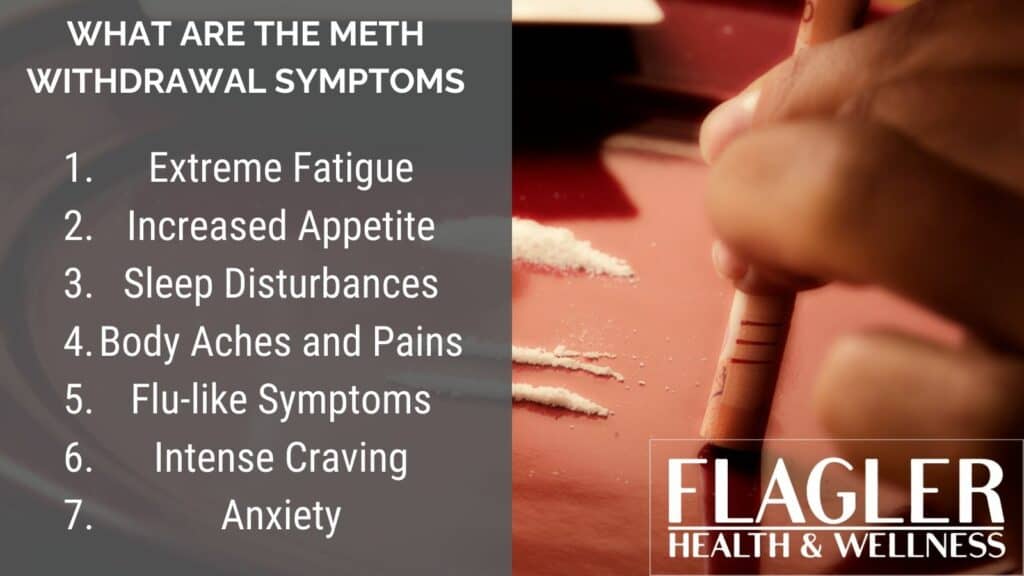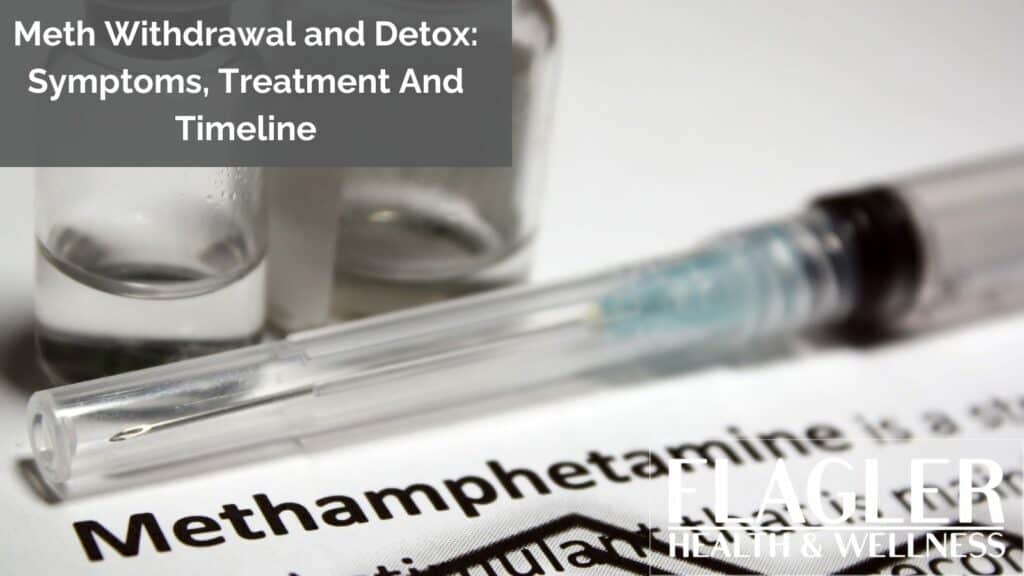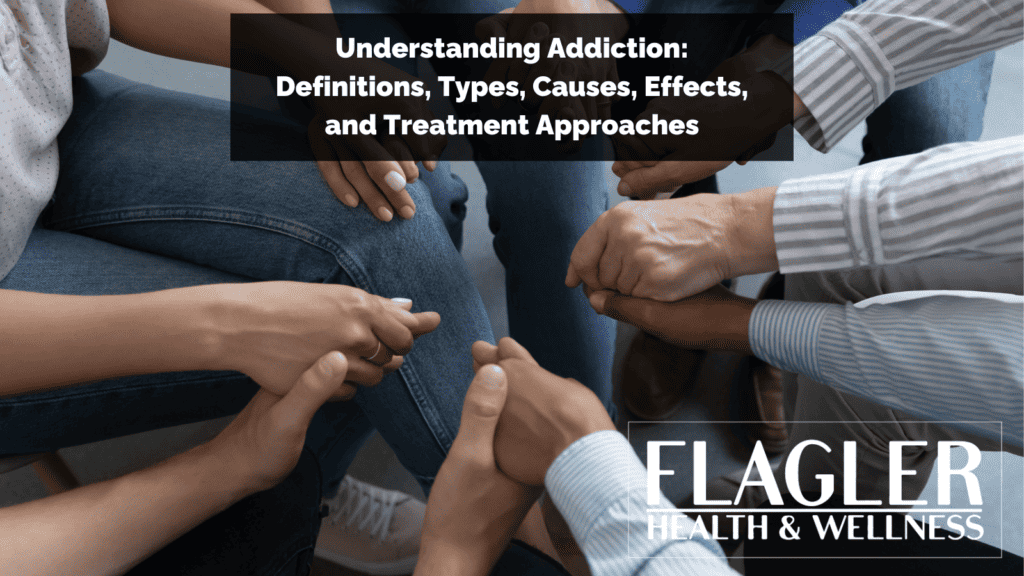Meth is one of the most addictive drugs available in the world today. Once a physical dependence on any drug has been established, people will experience mild to severe withdrawal symptoms when they stop using. The journey to recovery from a meth addiction is challenging, and begins with a medically supervised meth detox. By understanding the symptoms, proper treatment of, and withdrawal timeline of a meth detox, you will be able to support someone on their path to recovery, and even save someone’s life.
What Is Meth?
Methamphetamine is a highly addictive, dangerous stimulant drug that has profound and long-lasting effects on the central nervous system. It has been classified as a schedule II drug, which means that it is legally available through a non-refillable prescription only. Meth looks like a white crystalline powder which can easily be dissolved in water or alcohol. When ingested, meth leads to a fast acting, euphoric high, which leads to severe physical and psychological dependence with repeated use.
What Happens During Meth withdrawal?
During meth withdrawal your mind and body are reacting to the absence of the drug. Common symptoms of meth withdrawal include fatigue, increased appetite, and intense drug cravings. Emotional challenges such as depression, anxiety, and irritability are also prevalent during this phase. It’s important to realize that withdrawal is a time when you will need more support, not less, to help get you through the discomfort.
Factors That Affect Meth Withdrawal
There are many factors that can influence the intensity and length of the meth withdrawal process. Some of these factors include your history of meth and other drug use, your overall health, age, weight, and any co-occurring mental health issues, such as depression or anxiety. Addressing a person’s specific circumstances calls for a personalized treatment plan that will cater to their unique needs and provide them with the best support possible.

What are the Meth Withdrawal Symptoms?
It’s important to be able to recognize the signs of drug withdrawal, as this knowledge can potentially save someone’s life. These withdrawal symptoms can be physical and or psychological and should be addressed with the help of a medical professional.
Physical Symptoms of Meth Withdrawal
Detoxing from meth can result in a wide range of physical withdrawal symptoms which may include:
- Extreme Fatigue: As the body adjusts to the absence of the stimulant, individuals often experience profound tiredness and lack of energy.
- Increased Appetite: Meth suppresses appetite, so during detox, individuals often experience a significant increase in hunger.
- Sleep Disturbances: This includes challenges in falling asleep, staying asleep, or, conversely, sleeping for extended periods.
- Body Aches and Pains: Withdrawal can cause physical discomfort, including headaches, muscle aches, and general bodily pain.
- Flu-like Symptoms: Some individuals experience symptoms similar to the flu, such as nausea, dehydration, fever, and sweating.
Psychological Symptoms of Meth Withdrawal
Psychological withdrawal symptoms are often more challenging to manage and include:
- Intense Cravings: The urge to use meth again can be overwhelming and is often the most significant hurdle during the early stages of detox.
- Anxiety: Feelings of anxiety, restlessness, and irritability are common as the brain chemistry adjusts.
- Depression: This can range from mild to severe and is often accompanied by feelings of hopelessness and disinterest in activities once found enjoyable.
- Psychosis: In some severe cases, individuals may experience paranoia, hallucinations, and delusions during detox.
- Cognitive Impairments: Difficulty concentrating, confusion, and memory problems are also noted during the meth withdrawal process.
How Long Does Meth Withdrawal Take During Detox?
Meth withdrawal can last anywhere from a few days to a few weeks and varies from person to person. Different factors including the method of use, history of use, and dosage will all have a big impact on the detox timeline. Other personal factors such as a person’s metabolism, age, and physical health will also have a significant impact on the detox process. Here is a general breakdown to follow as a reference:
Stage One: The first 24- 72 hours are often the most challenging part of the withdrawal phase. People often have intense cravings for meth during this time and may also experience severe psychological withdrawal symptoms.
Stage Two: During days 4-10 of a meth detox, people tend to experience the most intense physical symptoms, which may require support from medical professionals.
Stage Three: Both physical and psychological symptoms gradually begin to lessen from day 11 onward, up to at least 30 days. However, some long-term users may experience prolonged withdrawal symptoms.
How To Treat Meth Withdrawal
A medically supervised detox is almost always the first step of the meth withdrawal process. Other forms of treatment, such as consistent therapy in an inpatient setting can help with positive recovery outcomes. Treating meth withdrawal requires a comprehensive approach that combines medical, psychological, and social interventions. It’s important to note that receiving professional help from healthcare providers experienced in addiction treatment is necessary because they have the expertise that can help you heal.
Treatment Plan For Meth Withdrawal During Detox
Having a structured treatment plan during detox is important for a successful recovery journey and will be unique to the individual. Managing withdrawal symptoms, whether they are physical, emotional, or psychological is of the utmost importance. This may involve being prescribed medication to help individuals cope with more intense withdrawal symptoms and or different kinds of therapy to help ease and manage the emotional aspects of the detox process.
Can I Die From Meth Withdrawal?
While meth withdrawal itself is not typically fatal, the complications arising from severe withdrawal symptoms can be life-threatening. Any drug withdrawal process should be treated like a potential medical emergency, which is why a medically supervised drug detox is always recommended, especially in the case of intense or prolonged symptoms. Medical supervision significantly reduces the risks associated with meth withdrawal.
Can Meth Withdrawal Cause Seizures?
Seizures are a potential complication of meth withdrawal, particularly in cases of long-term and heavy meth use. A medically supervised detox ensures that people withdrawing from meth are monitored 24/7 in case of emergency and to help treat and ease any symptoms that are already present. Consulting a medical professional during meth withdrawal is the best way to look after your wellbeing during what can be a difficult, unpredictable process.
How To Cope With Meth Withdrawal
Coping with meth withdrawal requires a multi-faceted approach. Consulting a medical professional with plenty of addiction treatment expertise and experience is always a good first step. Rehab programs offer medically supervised detox as well as different treatment options including group and private therapy that can offer you comprehensive support. Getting plenty of rest, eating nutritious food, staying hydrated, and spending time in nature are all good ways to help cope with meth withdrawal.
Get Help at Flagler
Finding a reliable and vetted meth detox program is crucial for a safe and effective recovery journey from a meth addiction. Look for centers that offer medically supervised detox as well as physiological support so that you can receive the full spectrum of support during the meth withdrawal process. At Flagler, we are invested in providing you the greatest care possible while you step into your healing journey – contact us to start your recovery today.
Share This Post







